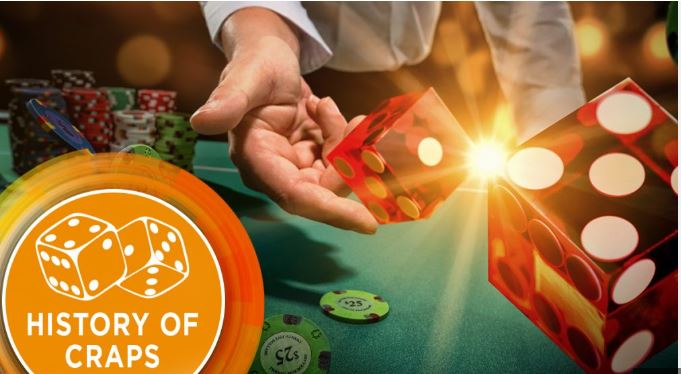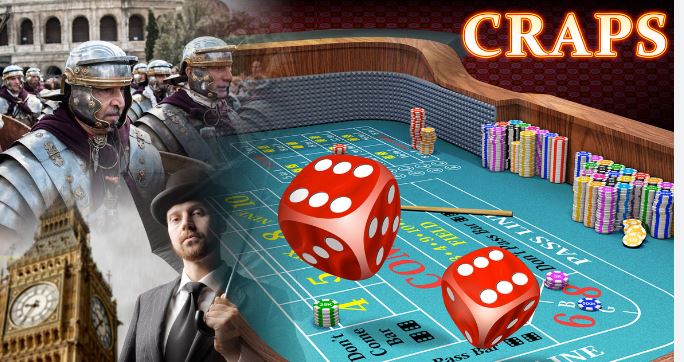
The history of craps games is an intriguing one that spans many years and nations. Here is a quick look at the history of Craps, including its origins, development, and growth into the game we know today, and the reasons it became so well-liked in casinos all over the world.
Ancient Times
One of the best casino games to have endured for several hundred years is without a doubt craps, although it’s unclear exactly who may claim to have originated it. Some legends claim that soldiers in Ancient Rome looked for ways to pass the time between conflicts. They began a game of chance, using their shields as makeshift gaming surfaces and animal knucklebones as dice.
According to another legend, there is a dice game known in Arabic as Al Dar, which is short for “dice.” It is thought that merchants finally took the game to Europe in the 12th century.
From here, it appears that a guy by the name of Sir William of Tyre gave the game his own twist around the time of the Crusades in 1125 and gave it the name “Hazarth,” which may have been a castle’s name. In the 17th century, the game reappeared in French taverns under the name “Hazard,” which is similar to Sir William of Tyre’s “Hazarth.”
“Street craps” became popular since it required little equipment to set up an exciting game, and it appears that the French may be to blame for its contemporary, slightly odd name of “craps.” Players are said to have sat slumped over the dice on sidewalks and in alleyways, giving off the impression of toads, or “crapaud” in French.
Craps Games In The Middle Ages
The game of craps, according to some sources, shares a lot of similarities with the Middle Ages Arab game “azzahr” (Hazard), which was quite common.
During the Middle Ages, the early version of craps was able to spread quickly throughout Europe and even managed to gain some traction in England. Geoffrey Chaucer regularly mentions it in his “Canterbury Tales,” which, in the opinion of some researchers, shows that the game was well-known at the time.
The game of hazard eventually spread to the opulent gambling establishments in England during the late 1600s and early 1700s. The game became a great social event since some of the most ardent players were to be found among the royalty and the noblemen. In addition to commoners, noblemen enjoyed playing it.
According to historical accounts, Montmort reportedly set the ground rules for Hazard in the 1700s.
Crabs became a way of referring to the dice roll with the lowest value in the game, and some people believe that this is how the game’s original name of “hazard” got to be changed to the current name. When the game was first introduced to Acadia (a French colony), it was in the early 1700s.
Craps Games Coming to America
A nobleman and gambler who arrived in New Orleans from London in 1805 is thought to have brought the game to the country. Players had to roll a seven in his version of craps, which quickly gained popularity in American casinos.
Due mostly to varied sets of rules that were implemented depending on where you played the game, the game courted a good bit of controversy over the following 100 years. So, in 1907, a dice maker named John H. Winn established one set of regulations that are still followed in the majority of craps games today. The creation of the Don’t Pass bet, which allowed players to wager against the shooter, and a more straightforward structure for the craps table were both well-liked additions.
Craps gained popularity and became a popular diversion for American soldiers during World War II once the element of guesswork was eliminated. In numerous casinos in Las Vegas and the Caribbean by the 1960s, the game had established itself as a staple.
Modern craps
Players actively encourage the shooter to throw the dice against the house and perhaps win at the craps table nowadays, which is frequently the center of contemporary gambling places with lively action and loads of fun.
A Bronx Tale and Guys and Dolls are only two musicals and movies that have used the game in their plots. The World Craps Championship (WCC), which gives lucrative six-figure payouts to successful players, and other large-prize events have helped raise the game’s reputation.
Since 1989, a lot of players have aspired to join the Golden Arm Club, a sort of hall of fame for shooters who can go an hour or more without losing at craps. Stanley Fujitake became the first member when he managed to roll 118 times in a span of three hours and six minutes without ever hitting a seven. He reportedly won $1 million and pocketed it!
Craps in the 20th Century
Craps developed become a well-known card game in the 20th century. Its roots were deeply ingrained in American culture before it split into the two primary varieties of casino craps and street craps. Since that time, thousands of players from all over the world have found craps to be one of the most appealing casino games.
Craps underwent a revolution in 1907 thanks to John H. Winn. He was given the honorific title of “Father of Modern-Day Craps” for precisely this reason. He changed things so that now participants might bet right or incorrect. Additionally, Winn enhanced the design of the game and added the “Don’t Pass bets” section.
The layout and betting structure that Winn created for the game of craps are still in use today.
This variation is also referred to as casino craps or modern craps. Casino games in general rose in popularity in America later, after gambling was made legal in Nevada in the 1930s. Because of this, casino craps rose to prominence in casinos and became one of the most popular games there.
Craps was a popular game among soldiers during the Second World War to pass the time before combat. There are only a handful of areas on Earth where the game of craps is unknown because it spread over the world during the war.
The popularity of the game of craps has grown over the past century as thousands of players look for strategies to reduce the house edge. In an effort to profit from the game, numerous betting and progressive craps systems have been created, and the crooked dice method that was abandoned during the time of John H. Winn has now been resurrected.

Craps in the 21st Century
Technology advancements allowed for the internet expansion of the gambling business. The success of the internet company was actually already predetermined once the gambling industry joined the Internet’s services because the casino sector grew more fascinating and traditional games were merged on online casino platforms.
Casino patrons now have a simpler way to play the dice game of craps and can decide whether to wager real money or play for fun. Currently, a wide range of web-based casinos offer a huge selection of craps variations with outstanding appearances and features.
The fact that most brick-and-mortar casinos function more or less as a social hub makes this the sole aspect of craps that an internet version of the game could hardly adequately portray. Even if gamers prefer playing online, there are still plenty of options available to them thanks to the industry’s ongoing evolution.
Leave a Reply